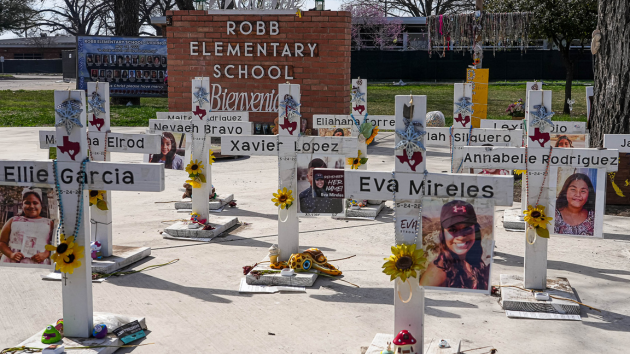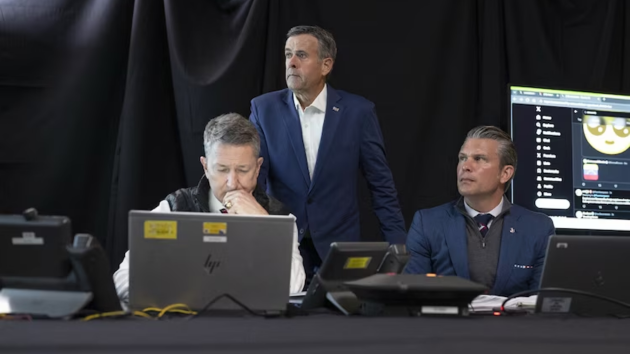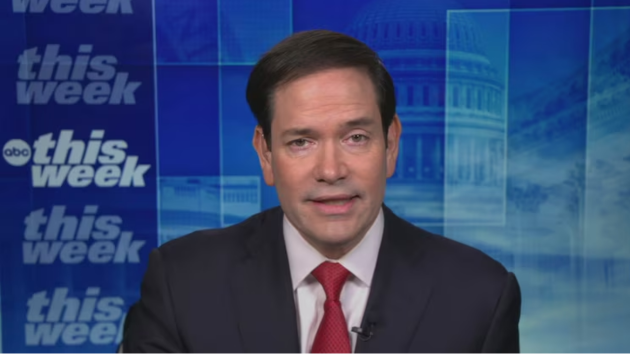The last heroes of Normandy return to France 80 years after D-Day invasion
Written by ABC Audio ALL RIGHTS RESERVED on June 9, 2024

(NEW YORK) — The sun was yet to rise over the beaches of Normandy when, on June 6, 1944 — 80 years ago this week — thousands of American sons and Allied troops began what would become the largest amphibious assault in history.
Their bravery and their sacrifice would turn the tide of World War II and push Nazi Germany to defeat.
For the last five years, ABC News’ “World News Tonight” anchor David Muir and his team have traveled around the country documenting the stories of World War II veterans who landed on those beaches on D-Day and the days that followed.
For the 80th anniversary of the Allied invasion, Muir met these quiet heroes as they journeyed back to Normandy, many of them for the first time since landing there as young soldiers fighting for freedom.
Out of the 16.4 million Americans who served in the armed forces during WWII, less than 1% of them were still alive at the end of 2023, according to estimates from the U.S. Department of Veterans Affairs.
The country loses an average of 131 WWII veterans every day.
Irving Locker is 99 years old, but in 1944 he was a 19-year-old staff sergeant in charge of 65 men. Drafted right out of high school in 1943, he went on to be in the First Army, 4th Infantry Div., 116th Anti-Aircraft Artillery Gun Battalion.
And he was with his battalion that fateful day in June. His orders: land and run through the beach and start setting up your guns.
He remembers the moment when — at 5 feet tall — he jumped into the frigid waters as German forces attacked the beaches.
“I’ve never seen as many dead men on the beaches as I’ve seen,” he told ABC News of the invasion.
“Everybody was scared,” Locker said. “The long life we figured we’re gonna have could be ended with one bullet, or one bomb, or one mine.”
Reflecting on his acts of service and those who paid the ultimate price with their lives, Locker said, “People have to know that freedom is not free.”
“So I’m doing that now with my full heart and conscience,” he said of returning to Normandy.
Jack Claiborne of Dyersburg, Tennessee, drove the troops to Omaha Beach on LCI 492. He was a helmsman and gunner.
“Seeing all of these boys that was killed, and just layin’ there on the beach,” Claiborne told ABC News in 2019. “It was just … tough for a little old kid to handle.”
“We were all young,” he said.
Claiborne died on September 28, 2023. His family told ABC News this year, he was proud to have served, and to have spent his last years talking about the war to younger generations.
At 102 years old, WWII veteran Andrew “Tim” Kiniry was just 22 when he landed on Omaha beach in the days after the invasion.
With no time to think and there to help the injured as a medic with the 45th Evacuation Hospital, Kiniry said soldiers had to keep moving.
As a young man at war, Kiniry kept a list of his outfit’s movements. Under June 1944, that list had two words: “bloody beach.”
Kiniry, who has lived in Vineland, New Jersey since 1964, fears the sacrifices of D-Day will be forgotten if veterans don’t share what they went through during the war.
Not a day goes by he doesn’t think about the men lost during the invasion. Now 80 years later, he’s going back to Normandy for the first time since he first landed there.
“Eighty years, and the people of Normandy are still honoring us,” Kiniry told Muir. “That’s somethin’ that gets – gets to me.”
‘It was just, take care of your friend. And that’s what we all did.’
Harold Himmelsbach landed in Normandy on D-Day at age 18, and called it “the most dramatic time” in his life.
Himmelsbach, who’s now 98, said in an interview with Muir commemorating the 75th anniversary of D-Day that he remembers seeing “things that very few people would ever see” in their lifetime. “I would see other guys die within feet of me.”
“You knew you had to do these things,” he continued. “It was just take care of your friend. And that’s what we all did.”
He remembers the letter he wrote to his mother.
“Dear mom I suppose I should begin by telling you I’m somewhere in France,” Himmelsbach wrote.
Born and raised in Dora, Alabama, Harold McMurran served with the 546th Ord as a FA, Instrument Fire Control Repairman, on June 6, 1944, on Utah Beach and faced 300,000 Germans.
Like many soldiers, McMurran kept a diary. On D-Day, he wrote, “June 6, 1944. Invasion started.” He wouldn’t write in his diary for the next five days.
In 2019, McMurran told ABC News he watched the medics trying to save his friends. “Sometimes they would be in worse shape than the men they were trying to take care of,” he said.
“People say, ‘How did you get off that boat and go in on that beach?’ There was a job had to be done,” he said, holding back tears. “Somebody had to do it. We did it.”
McMurran, who received the French Legion of Honor Medal, died on Dec. 25, 2022.
Jake Ruser was a combat medic in Normandy with the 4th Infantry Division, 2nd Brigade Medical Detachment, 12 Inf. Reg.
“For 67 years, I never talked about it,” he told Muir in the hallways of a high school in Downingtown, Pennsylvania, where he went to speak to a high school history class about the sacrifices made for freedom.
Those students were nearly the same age that Ruser was when he was sent off to war.
“You always went with the idea you were gonna make it through,” he told the students.
In Gainesville, Georgia, Alan Kinder prepared for his first trip back to Normandy since the invasion.
He remembers how the country came together when word got out that American troops had landed in France. And the scene when he got to Utah beach in the middle of the night.
“We knew the people had to be killed,” he told ABC News. “You grow up in a hurry.”
Kinder now grateful he gets to share his story, saying talking about it with his grandson, Justin, a history teacher, has brought them closer.
They traveled together to Normandy.
“Being able to come here and experience this with him, it’s – words can’t describe it,” Justin said. “It’s amazing.”
Onofrio Zicari, 96, of Las Vegas, fought with the 5th Amphibious Brigade, 5th Wave on D-Day.
“Man I was scared,” Zicari told ABC News. “I didn’t realize what war was until that day; it was awful.”
Now, 80 years after answering the call, Ruser, Kimora, Locker, Kinder and Zicari return to Normandy with help from the nonprofit, “Forever Young Veterans.”
Just before the anniversary commemorations, the five brave heroes journeyed back to Utah beach, where Muir met them.
Kinder, who has not set foot back on that beach until now, said he is grateful to be here. This is also the first time he has seen Utah Beach in the daylight.
“When they told me there was a chance to come here, I’ve kinda lived my life over again,” he said. “I’ve really, really enjoyed that.”
Locker told Muir that returning to Normandy meant that he came back because he’s determined to honor the sacrifices of D-Day, and hopes to connect with the next generation.
“I thank God every single day that I’m alive and well,” he said. “And people have to know that. People have to know that.”
Kiniry told Muir being back in Utah Beach reminded him of the brave men, his brothers, who were lost.
“It means a great deal to me to be here today to honor … the ones that lost their lives in particular,” he told Muir.
Ruser also took notice of the large number of people honoring the sacrifices WWII veterans made in Normandy. And as strangers approached them to shake their hands, he was moved by their gratitude.
“We’re meeting people from all over the world,” he said. “It’s really – something when you’re remembering what happened 80 years ago here.”
Zicari, who Muir first met five years ago, returned to Normandy again, thinking of the future.
“We fought for freedom,” he said. “We gotta have the younger generation help us now.”
“We’re depending on them. They depended on us. We’re gonna depend on them now,” Zicari added.
Diane Hight, the founder of “Forever Young Veterans,” told Muir about the mission they hope to achieve.
“We must never forget,” she said. “A lot of people think, ‘Oh. Well, how nice that you take these vets on trips.’ These are not vacations.”
“Do you know why they really wanna come back?” she continued. “They want to say to their friends that did not come home, ‘I haven’t forgotten you. And I hope I’ve lived my life where you’re proud of me.'”
Full episodes of “World News Tonight with David Muir” are now available to stream on YouTube.
Copyright © 2024, ABC Audio. All rights reserved.
 KVSP
KVSP 




